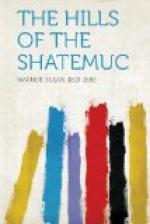“And a man shall be as an hiding-place from the wind, and a covert from the tempest; as rivers of water in a dry place; as the shadow of a great rock in a thirsty land.”
“Is that plainer?” he asked.
“It means the Saviour?” said Elizabeth.
“Certainly it does! To whom else should we go?”
“But Mr. Landholm,” said Elizabeth after a minute’s struggle, “why do you shew me this, when you know I can do nothing with it?”
“Will you do nothing?” he said.
The words implied that she could; an implication she would not deny; but her answer was another burst of tears. And with the book in her hand he left her.
The words were well studied that day! by a heart feeling the blast of the tempest and bitterly wanting to hide itself from the wind. But the fact of her want and of a sure remedy, was all she made clear; how to match the one with the other she did not know. The book itself she turned over with the curiosity and the interest of fresh insight into character. It was well worn, and had been carefully handled; it lay open easily anywhere, and in many places various marks of pencilling shewed that not only the eyes but the mind of its owner had been all over it. It was almost an awful book to Elizabeth’s handling. It seemed a thing too good to be in her hold. It bore witness to its owner’s truth of character, and to her own consequent being far astray; it gave her an opening such as she never had before to look into his mind and life and guess at the secret spring and strength of them. Of many of the marks of his pencil she could make nothing at all; she could not divine why they had been made, nor what could possibly be the notable thing in the passage pointed out; and longing to get at more of his mind than she could in one morning’s hurried work, she found another bible in the house and took off a number of his notes, for future and more leisurely study.
It was a happy occupation for her that day. No other could have so softened its exceeding weariness and sadness. The doctor gave her no comfort. He said he could tell nothing yet; and Elizabeth could not fancy that this delay of amendment gave any encouragement to hope for it. She did not see Winthrop at dinner. She spent the most of the day over his bible. Sickness of heart sometimes made her throw it aside, but so surely sickness of heart made her take it up again.
The thought of Winthrop himself getting sick, did once or twice look in through the window of Elizabeth’s mind; but her mind could not take it in. She had so much already to bear, that this tremendous possibility she could not bear so much as to look at; she left it a one side; and it can hardly be numbered among her recognized causes of trouble.
The day wore to an end. The evening and the sea-breeze came again. The lamps were lit and the table dressed with the salver and tea-urn. And Elizabeth was thankful the day was over; and waited impatiently for her friend to make his appearance.




